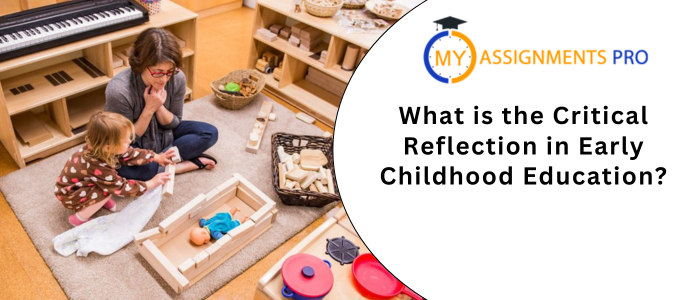
One of the most important stages in the childcare procedures is the critical reflection. It is a process that certainly pushes early childhood educators to analyze their choices, practices, and affective issues in learning for children by improving. Critical reflection in childcare allows teachers to become aware of their values, prejudices, and the areas where they can improve via the process of continually asking themselves the questions why and how things happened, rather than just simple reflection, which is usually concentrated on what has happened. Experts can aid quality and inclusive education by making informed, ethical choices based on their knowledge of what critical reflection in childcare is. This skill ensures lifelong learning, whether you're a pupil composing a critical remark about childcare or a teacher who wants to push his or her career further. With the help of My Assignments Pro, this blog examines the importance, process, and examples of critical reflection in early childhood education so you can become a master of reflective practices throughout your childcare.
What is Critical Reflection in Childcare?
In early childhood education, critical reflection is fundamentally a thorough process whereby the educators cautiously examine their instructional methods, decide on the options, and work with the children to facilitate learning and development. The process involves questioning as well as just thinking about the matter. The questions include why, how it has impacted the child, and how it can potentially change. Being aware of the potential of critical reflection to establish inclusive, ethical, and informed practice in early childhood settings is what understanding of critical reflection in childcare means.
By means of reflective analysis, educators discover personal characteristics that govern their behavior, such as values, biases, and unstated beliefs. This gives them the power to improve their work, make necessary changes, and grow as professionals. In conclusion, critical reflection in childcare leads the everyday events to be turned into learning.
Why is Critical Reflection in Early Childhood Education Important?
In early childhood education, critical reflection is a powerful tool with a direct influence on the quality of instruction, learning, and care in daycares. It allows teachers to reflect on their practices, assess the impact of their decisions, and align their behavior with moral and developmental standards. But what makes this process so important in the daycare sector? Let's take a closer look at that.
Enhances the Quality of Childcare Practices
Critical reflection's ability to support teachers with what is and what is not effective is one of the primary reasons that make it so essential within critical reflection in childcare. Teachers can enhance their approaches to better meet the developmental requirements of their pupils by reflecting on daily activities, interactions, and learning strategies. Higher levels of care and education are the result of this ongoing cycle of evaluation and development.
Promotes Professional Growth and Accountability
In early childhood education, critical reflection is fundamentally a thorough process whereby the educators cautiously examine their instructional methods, decide on the options, and work with the children to facilitate learning and development. The process involves questioning as well as just thinking about the matter. The questions include why, how it has impacted the child, and how it can potentially change.
Improves Child-Teacher Relationships
Teachers are able to connect with kids in a more meaningful and intentional way through reflective practices. By assessing children's emotional reactions, communication styles, and educational methods, teachers can create more responsive and trustful relationships, which are indeed the key to children's emotional and social well-being.
Drives Meaningful Change in Learning Environments
Critical reflection in childcare promotes actionable change based on careful analysis, whether it's altering a behavioral technique or the arrangement of a learning area. Teachers can make well-informed changes that benefit kids and the larger learning community by using real-life critical reflection in childcare scenarios.
How to Engage in Critical Reflection in Childcare?
Critical reflection in childcare is a purposeful and careful process that enables teachers to critically assess their behavior, convictions, and results. It assists in converting routine teaching moments into chances for both professional and personal development. However, how precisely can teachers put this into practice methodically and efficiently? Let's examine the procedures and methods for effectively implementing critical reflection in childcare education.
Begin with Observation and Experience
Noticing an event, incident, or discussion in the class is the initial step in critical reflection in childcare. The event could be a positive thing, such as a child reaching a milestone, or a negative thing, such as a child struggling. Being able to see why these everyday events are important is the starting point for further exploration.
Ask Critical Questions
Teachers need to pose insightful queries like these to go beyond superficial reflection:
- What took place during the incident?
- What caused me to react as I did?
- What emotions and responses did the kids have?
- What principles or convictions drove my behavior?
- How might I have handled this differently?
Explore Multiple Perspectives
In early childhood education, effective critical reflection entails taking into account several points of view. This could consist of:
- What would a child think of this?
- How would a parent feel?
- What do my coworkers notice?
- In what ways does theory validate or refute my behavior?
Connect with Theory and Research
Critical reflection in childcare is helpful both academically and professionally since it connects real-life experiences to theoretical frameworks. Structured approaches to practice analysis and improvement are provided by models such as Brookfield's Four Lenses, Kolb's Learning Cycle, and Gibbs Reflective Cycle.
Learning outcomes and assignment quality are improved when a critical reflection is incorporated into a childcare example and linked to a recognized theory.
Record Your Thoughts
Writing is an effective way to reflect. Teachers can monitor their learning and development over time by keeping reflective notebooks, blogs, or digital portfolios. Academic papers, team conversations, and performance reviews all benefit greatly from this written documentation.
The greatest responses to students' frequently asked questions on reflection in childcare are well-documented reflections that include analysis and action items.
Develop an Action Plan
The impact of critical reflection in childcare without action is minimal. Plan out precise actions to improve or change a situation after it has been analyzed. For instance, you may incorporate varied books or events into your curriculum if your critical reflection in the childcare example reveals a lack of cultural diversity.
What distinguishes critical thinking in childcare from simple observation is this dedication to progress.
Share and Discuss Reflections
Reflection done in collaboration enriches the process. In childcare settings, exchanging ideas with mentors or peers promotes conversation, brings in fresh viewpoints, and creates a culture of reflection. Additionally, it encourages shared accountability for excellent practices and acknowledges your experiences.
Common Challenges in Critical Reflection in Childcare!
Reflective thinking is of utmost importance for a child's professional development and better learning outcomes, but it still faces some difficulties when it comes to its everyday application. It should be mentioned that the reflective process is fraught with some challenges, no matter if the practitioner is looking for ways to improve work or if the student is writing a critical reflection sample in the field of childcare. Let's examine the typical obstacles that teachers and students have when participating in critical reflection in childcare education, as well as potential solutions.
Time Constraints and Hefty Workloads
Lack of time is one of the main obstacles to critical reflection in childcare. Teachers frequently balance class planning, child supervision, meeting attendance, and administrative responsibilities. It becomes challenging to find time for introspective thought in a schedule this full. Consider including brief periods for introspection in your daily schedule, like following a significant task or during changes. Even quick voice notes or journaling can be useful for jotting down ideas for subsequent consideration.
Fear of Judgment or Criticism
Because they worry about being criticized by their colleagues or superiors, many educators are reluctant to reflect honestly. It might feel vulnerable to admit faults or areas of weakness, which is a common part of reflection. Recognize that critical reflection in childcare is a tool for development rather than a form of discipline. Encourage an atmosphere of candor and openness where thoughtful conversations are seen as teaching moments rather than as a means of criticism.
Lack of Training or Understanding
Some professionals find it difficult just because they are unsure of what critical reflection in childcare is and how to use it properly. Without precise direction, reflection could remain superficial and not result in significant change. Look for possibilities for professional growth or speak with mentors who can walk you through reflective models and offer examples. For academic assistance and real-world examples, you can also turn to professional services like My Assignments Pro.
Difficulty in Applying Theory to Practice
It might be difficult for many teachers and students to relate their own experiences to abstract ideas. The reflection is anecdotal rather than analytical, without this link. To scaffold your analysis, use organized frameworks like Kolb's Learning Cycle or Gibbs' Reflective Cycle. To show a better grasp, including educational theories that are relevant to your critical reflection in childcare example.
Bias and Emotional Blocks
Our capacity to reflect impartially may be hampered by our preconceptions, assumptions, and emotional reactions. This may result in skewed judgments or a reluctance to face challenging realities. While reflecting, cultivate emotional control and mindfulness. To overcome your prejudices and guarantee a more comprehensive vision, take into account other viewpoints—children, families, and coworkers.
Inconsistent Practice and Follow-Through
If reflection is not done regularly, it frequently loses its value. One-time or sporadic reflections might not result in significant growth. Develop the practice of critical reflection in childcare as a routine.. To keep on course, use visual aids like feedback sheets, weekly goals, and reflection calendars. Consistency will eventually enhance the caliber and profundity of your reflections.
Limited Peer Collaboration
Isolated reflection can hinder development and limit insights. You can lose out on insightful viewpoints and collective learning if you don't get peer input. Use mentorship or team debriefings to promote thoughtful discussion among coworkers. In addition to improving individual understanding, collaborative reflection fosters a robust professional learning community.
Having the appropriate resources, attitude, and support networks can help you overcome these obstacles. Getting professional assistance can make a big impact, whether you're having trouble defining reflection in childcare or creating an assignment that includes a compelling critical reflection in childcare example.
We at My Assignments Pro provide early childhood education students with individualized academic support. Our specialists make sure you never feel trapped in your academic journey by helping you develop meaningful reflection activities and guiding you through reflective models.
How Can My Assignments Pro Help You with Critical Reflection in Childcare?
You're not the only early childhood educator or student who finds it difficult to engage in critical reflection in the childcare setting. Without precise instructions or a critical reflection example, general childcare, reflective writing, and analysis can be challenging. My Assignments Pro turns into your most dependable academic support resource at that point.
Expert Help with Reflective Assignments
Writing assignments that are not simply descriptive but also analytical and well-structured require an understanding of what critical reflection in childcare involves. My Assignments Pro provides professional assistance in creating excellent reflective assignments that meet your academic needs. Our experts assist you in delving deeper into reflective practice and moving beyond writing at the surface level.
Custom-Written Critical Reflection in Childcare Examples
To have a deeper understanding of the process, do you require a practical example of critical reflection in childcare? We offer specially crafted examples that demonstrate the integration of early childhood theories, frameworks such as Gibbs or Kolb, and professional standards with real-world experiences. You can enhance the quality of your writing by using these examples as models for your reflective work.
Understanding Theoretical Frameworks and Practical Application
When attempting to relate classroom experiences to educational ideas, many students encounter difficulties. Our professionals simplify difficult concepts into useful insights. We assist you in applying these ideas to your critical reflection in childcare education, which enhances the credibility and academic soundness of your work.
Personalized Feedback and Revisions
We offer individualized comments and editing assistance in addition to content delivery. Our childcare assignment help staff can help you make the required changes if you're unclear about the assignment's depth, tone, or structure. This guarantees that your childcare assignment's critical reflection is strong and prepared for submission.
Time-Saving and Stress-Free
Reflective writing might feel daunting due to tight deadlines and hectic schedules. You can fulfill your deadlines with My Assignments Pro without sacrificing quality. We offer prompt, private, and precise services, whether you need assistance comprehending what is meant by reflection in childcare or need whole assignment support.
It's not hard to become proficient in critical reflection in childcare. You may get expert advice, excellent nursing assignment help, and practical critical reflection in childcare examples with My Assignments Pro, which facilitates learning and writing.
My Assignments Pro is here to support your academic journey in early childhood education, from providing faultless assignments to assisting you in understanding the need for reflection in childcare. So that you may concentrate on becoming the greatest teacher you can be, let us handle the tension of your reflection writing.
Mitchell
Mitchell is a seasoned Ph.D. scholar with extensive expertise gained through years of rigorous research, publication, and teaching experience. He brings a wealth of knowledge and analytical skills to tackle complex academic challenges. His work is dedicated to delivering innovative solutions, advancing knowledge, and promoting academic excellence. Proficient in research methodology, data analysis, and scholarly writing, Mitchell has contributed to peer-reviewed journals and mentored students to achieve academic success.


